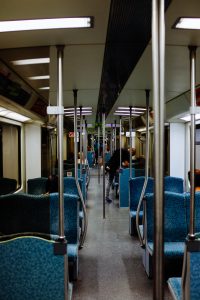Most of us want to stay in our communities as we age. We cherish our routines and connections with friends and services nearby. In a recent Metro Atlanta Speaks survey, 79% of residents 65 or older said they want to remain in metro Atlanta.


Neither Carl, age 83, nor his granddaughter, Erin, age 14, currently drive, but they both want to live as independently as possible. How their communities are designed and what they offer can either help or hinder their ability to do so.
What’s Makes a Community Lifelong?
Communities that are great places to live at every stage in life are achieved in a variety of ways and are pedestrian-friendly, affordable neighborhoods that work for all. Here are some features that make a community lifelong:
- Most communities have an abundance of owner-occupied single-family houses. These often come with large yards that are nice for families but not always suitable for us as we age. The addition of condos, duplexes, renter-occupied houses, and/or apartments in a community can help. Think creatively since most of the region’s neighborhood are already built out: permitting tiny houses in backyards, allowing house-sharing by multiple unrelated persons, and rehabilitating older run-down smaller houses rather than demolishing can expand affordable housing options within existing neighborhoods.

- Did you know that one in three Georgians over the age of 70 have stopped driving? Then what? There are ways a community can support non-drivers, such as creating complete-streets which may require removing a car lane on a multi-lane road to make space for pedestrians, bicyclists, and transit stops; expanding public transit options such as buses, light rail or shuttles; and supporting public trails and paths to provide alternative ways to get around.
- Neighborhoods that incorporate businesses and services as well as housing make it easier to get where you need to go without getting in a car. When people live in mixed-use areas, near transit, or near greenspace, home values benefit. A bonus is less traffic and pollution – something everyone can appreciate.
Is Your Neighborhood Lifelong?
Most of Atlanta’s communities are not designed for lifelong living. AARP has developed the AARP Livability Index tool that can help you gauge how your neighborhood ranks in livability compared to others throughout the nation. Scores can be obtained for your own street address or city on a range of 0 to 100. The score is based on seven broad categories of community livability: housing, neighborhood, transportation, environment, health, engagement, and opportunity. Those category scores are then averaged to create a location’s total livability score. Places are scored by comparison to other locations, with an average neighborhood receiving a score of 50. While individual places throughout the metro-Atlanta region have different scores, Atlanta’s overall score is 48 out of a possible 100 indicating we are around the national average and have room for improvement.
What YOU Can Do to Make Your Community Lifelong
Every community can make changes that improve the ability for older persons to age in place. It requires residents working with elected officials to take targeted action informed by public engagement, thoughtful public planning, and dedicated public resources.
Some change can happen through support of public referendums at the polls, such as expanding public transit or trails in your region. Other change happens through a combination of public incentives, such as tax breaks, or zoning measures regarding types of housing and land use.
Citizens’ understanding and vocal support of needed solutions is vital for meaningful action. Become more informed about Lifelong Communities solutions by reading ARC’s Aging and Independence Policy Briefs. Finally, speak up about your support of these measures – to elected officials and staff, civic and neighborhood groups, and friends and family. Be the voice that ignites change.


